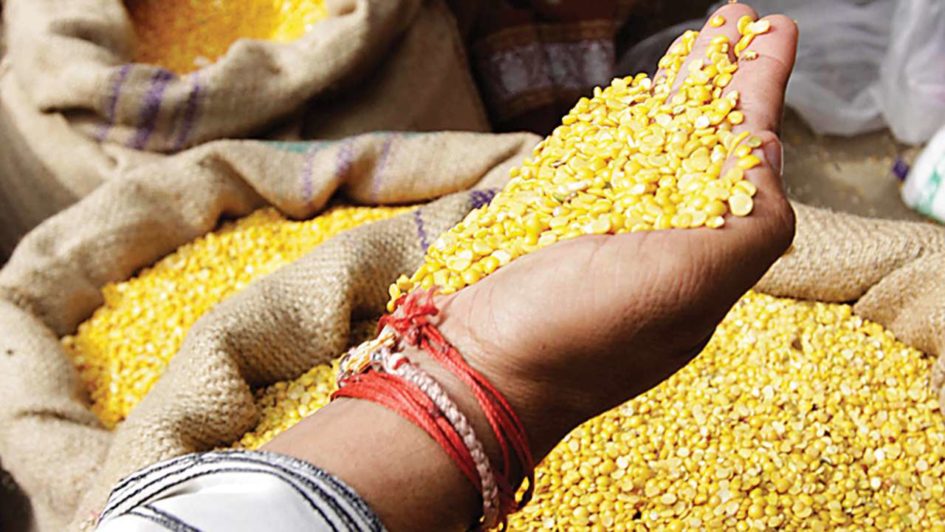
The year was 2015. May 24th 2015, it was. Exactly a year ago, Urad dal was hovering around Rs64-80 per kg. and Tur Dal was around Rs64-80 per kg. In just one year, the retail prices of pulses had shot up by 64%.
- Urad dal was Rs105–123 per kg
- Tur was Rs102–116 per kg
A few months later, Oct 2015, the price of Tur had touched Rs 120 per kg. The center started working with the state governments and as a result, 6077 raids were conducted across 13 states and approximately 75,000 tons of pulses were seized.
- 46,397 tonnes recovered from hoarders in Maharashtra
- Karnataka at 8,755.34 tonnes
- Bihar at 4,933.89 tonnes
- Chhattisgarh 4,530.39 tonnes
- Telangana 2,546 tonnes
- Madhya Pradesh 2,295 tonnes
- Rajasthan 2,222 tonnes

The above happened in 2015 when the essential commodities hoarding restrictions in place as part of the Essential Commodites Act. Imagine this situation with no hoarding restrictions in place and with no way to track who is hoarding how much, especially when anyone with just a Pan Card can buy/sell commodities. Yes, there are price triggers but they are too high to be met with.
Now here is the back story of what is also referred to as the Tur Dal Scam.
India’s annual demand for pulses (as of 2015) is around 22-23 million tonnes. The annual production was about 18-19 million tonnes which meant India had to import 3-4 million tonnes. The bulk of these imports are done by private importers.
The “Appraisal Report in the Case of Pulse Importers and Traders Group” of the Income Tax department summed up this crisis thus: (Read more details about the report)
The abnormal price situation in India was created by a coordinated collusive activity orchestrated by few trading and financial entities. The physical stocks of pulses (were) cornered in domestic and international markets. Significant long positions on the future were taken on exchanges to create an artificial scarcity at the wholesale and retail levels.
Information was gathered that few major commodity dealers having presence in overseas markets as well created a monopolistic condition by procuring and hoarding stocks of pulses in national as well as overseas markets. They rigged domestic rates to an unprecedented level to offload their stock procured at low rate. The super profit earned in this manner was not offered to tax and siphoned off either abroad or converted into unaccounted cash through entry operators.
- Currency Arbitrage –
- Monopoly of Commodity Dealers in Overseas Markets
- Tax Evasion
Economic Survey 2016–17 released in January gushed: “The prices of pulses, in particular tur or urad, remained persistently high from mid–2015 to mid–2016 due to shortfall in domestic and global supply. Since July 2016, pulses prices except gram dal prices have been declining owing to near normal monsoon, increase in the rabi pulses sowing and buffer build up by the government,” the survey stated even as it added a word of caution: “Vigilance is essential to prevent other agricultural products becoming in 2017–18 what pulses was in 2015–16 in terms of supply deficiencies and consequential higher inflation.”
If anything, the Essential Commodity Act, has to be strengthened not diluted the way the Farm Laws do
- Extra Ordinary Circumstances which warrant the price controls should also include anti-competitive behavior of any buyer
- The states must have regulatory oversight on these matters, not just the Center
- Real-Time stock position should be mandatory
- Auditing and monitoring should be mandatory
- Regulation must be on not just imposition of stock limits
- Price control
- Compulsory selling
- Movement control
- Price triggers that allow regulation to take place are specific to a locality, and of a lower range of price increase
- Online filing, audition and reporting
source: http://www.kisanswaraj.in/2020/09/14/why-the-opposition-to-3-agri-business-facilitation-bills/
Some FAQs
Q) If restrictions were removed more people/organizations are encouraged to store or to sell commodities without any fear of officials.This in-turn increases the competition thus countering the malpractices and ultimately helping farmers and consumers.
Ans) The Farm Laws are expecting that the private traders/corporates will always operate keeping the farmer interests intact and that they will not indulge in hoarding, in black marketing, in price manipulation, in artificially controlling the prices, in monopolizing the markets and that they will always be competitive with each other, that they will always create more opportunities for the consumers and the farmers – The Tur Dal Scam goes on to show that without enforcing a regulatory system, a thorough monitoring system, an audit-able system – the farmers are vulnerable to large scale exploitation. And not just the farmers, the consumers as well.
courtesy https://sureshe.wordpress.com/

Leave a Reply